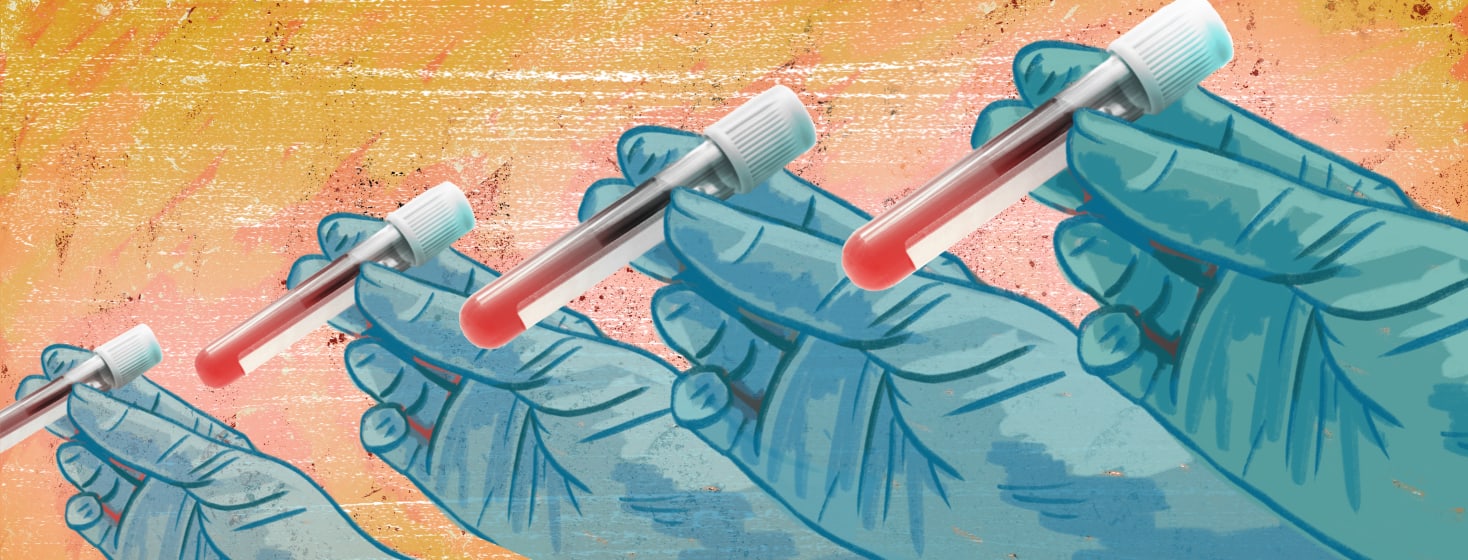Blood Tests for Diagnosing Ovarian Cancer
Reviewed by: HU Medical Review Board | Last reviewed: May 2021 | Last updated: December 2025
Early diagnosis of ovarian cancer is crucial. The earlier the diagnosis, the more effective the treatments. Doctors often use a variety of tests and tools to help them make a diagnosis of ovarian cancer. These include imaging, blood work, and surgery.
Blood work is not the only way to detect ovarian cancer, and it should not be the only test doctors use to make a diagnosis. However, when blood work is used along with other tests, it is an important part of the diagnostic process.
What is a complete blood count (CBC)?
A complete blood count (CBC) is a common lab test that can detect or monitor many different health conditions. A CBC measures different parts of the blood, including:1
- The number of red blood cells (RBCs), which carry oxygen
- The number of white blood cells (WBCs), which fight infection
- The amount of hemoglobin in the blood, which is the protein in RBCs that carry oxygen
- The number of platelets, which help with clotting
- Hematocrit, which is the percent of blood that is RBCs
If there are abnormal counts, this might be a sign that you have a medical condition. Your doctor might then order more blood tests or different types of tests.
A CA-125 tests offer more clues
A cancer antigen 125, or CA-125 test, is often used if a doctor suspects a woman has ovarian cancer. CA-125 is a protein that is produced on the surface of cells and released into the blood, and it is one of the primary tumor markers (signs of cancer in the blood, urine, or tissues) used by clinicians. CA-125 is high in more than 80 percent of women with advanced ovarian cancer and in 50 percent of those with early-stage ovarian cancer.2
The CA-125 test is usually just 1 of several blood tests that help doctors make a diagnosis of ovarian cancer. Test results can help doctors monitor a woman’s response to ovarian cancer treatment. In some cases, it is used along with CT scans to detect ovarian cancer recurrence (return of the cancer following treatment). However, the reported benefits of this are mixed.2
Elevated CA-125 levels can also be caused by other health conditions, including liver cirrhosis, pregnancy, endometriosis, diverticulitis, and uterine fibroids. This is why it is not a widespread screening tool for ovarian cancer, nor is it the only test that should be used to make a diagnosis.2
Why do liver and kidney function tests matter?
Liver and kidney function tests can help rule out other conditions that could be causing symptoms similar to ovarian cancer. These tests also help doctors get a picture of your general health. Cirrhosis of the liver can raise CA-125 tumor marker levels. Many liver or kidneys conditions can cause abdominal pain or swelling. These tests help to narrow down the underlying cause of these symptoms.3,4
A liver function panel test is a blood test that looks at how well the liver is working. Abnormal levels might mean there is liver damage or disease.3
Blood and urine kidney function tests can show how well the kidneys are working. These tests can also show how quickly bodily waste is being removed and measure protein levels in the urine. High levels can be a sign of kidney damage.4
Other tests can aid in diagnosis
Some germ cell ovarian cancers can cause other tumor markers to rise. These tumor markers include:5
- Human chorionic gonadotropin (HCG)
- Alpha-fetoprotein (AFP)
- Lactate dehydrogenase (LDH)
You might have blood work to test for these if your doctor thinks you have a germ cell tumor. If your doctor thinks you have a stromal tumor, you might also have blood work to test your estrogen, testosterone, and inhibin (a hormone produced in the ovaries) levels.5
Things to remember
Blood work is an important diagnostic tool for your doctor. A diagnosis of ovarian cancer cannot be made from blood work alone. However, it can help your doctor assess your overall health, rule out other health conditions, and aid with diagnosis.
